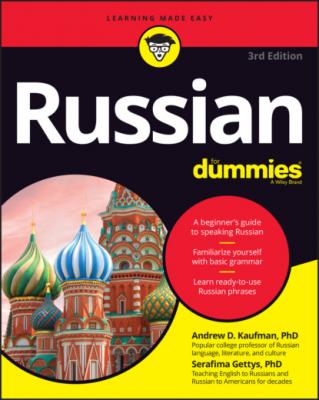Russian For Dummies. Serafima Gettys
Читать онлайн.| Название | Russian For Dummies |
|---|---|
| Автор произведения | Serafima Gettys |
| Жанр | Иностранные языки |
| Серия | |
| Издательство | Иностранные языки |
| Год выпуска | 0 |
| isbn | 9781119984634 |
You’ll also be armed with a battery of questions that are great icebreakers, such as the following:
Oткудaвы? (aht-kooh-duh vi?) (Where are you from?)
Cкoлькoвaмлeт? (skohl’-kah vahm lyeht?) (How old are you?)
Увacбoльшaяceмья? (ooh vahs bahl’-shah-yeh seem’-ya?) (Do you have a big family?)
Ктoвыпoпpoфeccии? (ktoh vi pah prah-fyeh-see-ee?) (What do you do?)
Finding your way around
Eating out and buying food
You can discover more Russian to use while eating out and buying food at a market in Chapter 9.
Going shopping
A couple of Russian phrases are especially useful when you go shopping. To ask how much something costs, use the phrase Cкoлькocтoит …? (skohl’-kah stoh-eet…?) (How much does … cost?), inserting the name of the item if you’re buying one thing. If you’re buying more than one thing, ask Cкoлькocтoят…? (skohl’-kah stoh-eet…?) (How much do … cost?), using the word for the items in plural form.
Chapter 10 features a lot more shopping vocabulary and phrases for getting help, trying on clothes, asking for specific colors, and paying for the merchandise you buy.
Exploring entertainment opportunities
Exploring new places and meeting new people are always fun. When you head out on the town, you may choose among a variety of activities. You might decide to check out a museum, a movie, or a play, for example.
Going out on the town often involves making plans, buying tickets, and finding the correct seating. Chapter 11 helps you navigate all these tasks in Russian.
Doing business and communicating
If you’re planning a business trip to Russia or need to speak to Russian colleagues in your home office, you should definitely see Chapter 12. There, you find common words and phrases used in an office setting. In addition, you find guidance to help you master the art of telephone conversations in Russian — and don’t forget about using computers and sending correspondence (and text messages, too)!
Enjoying sports, hobbies, recreation, and more
Hobbies can take many forms, and you may want to share information about yours with friends and acquaintances in Russian:
If you’re a sports fan, you’d better know how to talk about your favorite sports in Russian. (Also prepare to be converted into a fan of soccer or hockey — Russians’ two favorite games.)
Russians are avid readers and, for the most part, very well-read. So if you’re speaking Russian, be prepared to say at least something about books and literature genres you like or dislike. Beware: Saying “I don’t read much” can earn you a tarnished reputation.
If you happen to be in Russia in summer, late spring, or early autumn, don’t miss the experience of going to a country house on a weekend. You’ll never forget it.
See Chapter 13 for more about hobbies and the great outdoors.
Getting a Handle on Travel Topics
After you’ve had time to practice Russian at home, you might consider traveling to Russia. Be sure to acquaint yourself with the following tasks in Russian:
Preparing for a trip: Planning a trip is an enjoyable part of the travel process, and we let you enjoy it to the fullest with phrases and words you need to decide where you want to go, book your trip, and pack. All this info and more is in Chapter 14.
Making sense of money: Financial matters can be very confusing when you travel to a different country because you deal with foreign currency while performing such everyday transactions as getting money out of an ATM, using your credit card, and paying with cash. Chapter 15 provides plenty of guidance on how to manage your money and perform financial transactions.
Getting around with local transportation: Clearly, expertise in using various types of public transportation is an important skill for a traveler. Dealing with public transportation isn’t as easy as it may seem if you’re speaking a new language! Don’t panic, though; just turn to Chapter 16 for help.
Securing a place to stay: Hotels, as you know, can be good, bad, or ugly. To avoid the latter, we provide you essential questions to ask before buying into a deal. Chapter 17 provides Russian vocabulary that helps you make hotel reservations, check in, resolve issues, and pay your bill.
Taking action during emergencies: We hope that
